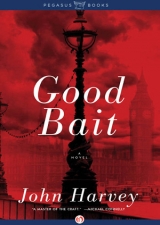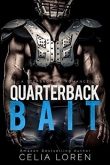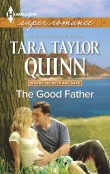
Текст книги "Good Bait"
Автор книги: John Harvey
Жанр:
Триллеры
сообщить о нарушении
Текущая страница: 13 (всего у книги 19 страниц)
39
Cordon had tried bringing up the subject of what had happened to Maxine, Letitia’s mother, a number of times, but on each occasion got little response other than an impatient sigh and shake of the head, clear signs that as a topic it was closed. On other occasions, the reply was more emphatic. ‘How many more times, she fell under the fucking train!’
It wasn’t until they were sitting outside, one evening, dusk closing around them, Danny in bed early, exhausted by the day, that Letitia raised it herself.
‘Parlo, he was there at the house when she come round. Question after bloody question. Wouldn’t take no for an answer. Threatened to clip her one and she laughed in his face, told him if he did that she’d be back with the police.’
‘How d’you know this?’
‘He rung Anton, didn’t he? On account of she’d mentioned my name, said who she was, who she claimed to be. Anton told him to frighten her off, make sure she never come back.’
Letitia stopped and poured herself more wine.
‘That’s what he did. Followed her to the station.’
‘Pushed her under the train?’
‘Not according to him. Lost sight of her on the platform. Only saw her again at the last minute, just as the train was coming in. Tried to elbow his way through the crowd towards her, but with everyone else pushing and shoving, fighting to get on, somehow, he says, she went under. He hadn’t been able to get near her. Nothing he could do. Walked away.’
‘You believe that?’
‘That he walked away? Got out of there as soon as he could? Sure, of course.’
‘That he didn’t have anything to do with what happened?’
She shrugged and reached for her cigarettes. ‘What’s it matter? Pushed, fell, either way? Not going to bring her back, soft cow.’
Cordon bit back his words. Her mother, not his. Her life to live.
Neither of them mentioned it again.
Jack Kiley had been in touch that morning. According to Taras, his brother was gradually coming round; just give him a little longer and he thought Anton could be persuaded to agree to some kind of reasonable arrangement, shared access to his son in exchange for financial support. Just give him a little more time.
Time they still had.
Venturing out into the surrounding area, they found, less than fifteen minutes’ drive away, a family theme park with bouncy castles and trampolines and pedalos; a small paddling pool, where Danny screamed with delight at the sudden shock of cold; a petting zoo with sheep and goats and a pair of long-eared donkeys, shaggy in their winter coats.
Emboldened, they drove north to the Pink Granite Coast and followed the path as it wound between vast, impossible formations of rocks shaped by the sea and the wind; parked above the empty swathes of sand at Beg Leguer, where Cordon and Danny combed rock pools for shrimps and tiny crabs, while Letitia sheltered out of the wind and smoked and read for the second time a Maggie O’Farrell she’d found stashed behind all those dry and clever men on the bookshelves where they were staying.
On a shopping expedition to the Carrefour in Guingamp, Danny picked up a flier advertising the Haras National de Lamballe, the national stud. Guided tours at three p.m., Tuesdays to Sundays. The illustration showed a stallion rearing irresistibly up into the sky, its mane catching the rays of the sun.
‘Please!’ Danny cried. ‘Please!’
Smiling at his anticipation of such pleasure, Letitia agreed.
Lamballe was where they had switched cars, no more than an hour and a half away; Cordon could call in at the office while they were there, extend the period of loan. Give the boy his wish.
The sun shone, still weakly, but without a breeze they could delude themselves of its warmth. The tour of the stables was more interesting than either Cordon or Letitia had expected – some of the huge Breton horses weighing up to a ton – and Danny, in his element, ran from stall to stall, glowing with excitement; when the tour guide pointed to some hay and asked if he wouldn’t like to help feed one of the horses, it must have felt like heaven.
Afterwards, they sat outside a patisserie in the town square, Cordon and Letitia drinking coffee and sharing some kind of almond pastry, while Danny sipped hot chocolate through a straw and bit down into a coffee eclair so hard the cream splurged out from the far end, all over his face and hands.
Letitia caught Cordon’s look and instead of giving him a warning glance, she allowed herself a smile.
‘Good day?’ he asked, as they settled back into the car.
‘Not bad.’
Leaning across, she kissed him on the cheek, and from the back seat, Danny issued a little squeal of delight.
It couldn’t last.
40
Hugo French lay there, blocking out the sound, for as long as he could. Turning over, turning back. Moving the pillow beneath his head. Covers tugged this way and that. Kids. No, not kids. Older. Young men by the sound of them, their loud, overlapping voices rising up to the second-floor bedroom where he slept. Young blokes, not so very long out of the pub, standing around outside the house, arguing the toss. About what, Hugo didn’t know. Couldn’t tell. Just the odd word clearly audible, the pattern of phrases repeated over and over, the slightly dodgy double glazing unable to keep them out. ‘No, wait. Wait, wait, wait. Listen. Just fucking listen!’ Every second or third word, the swearing. Like some kind of punctuation, like breathing.
Time was, it would have been Mary awake before him, pushing back the duvet and padding to the window, thinking nothing of throwing it open and sticking her head out, complaining.
People sleeping …
Haven’t you got a home to go to …
Call the police if you’re not careful …
Not any more. The space beside him cold and uncomprehending. He rolled over on to his side and as he did so, the noises seemed to falter and fade. Thank Christ! They were moving away.
But then again …
‘Listen, you bastard! Listen, will ya! Fuckin’ listen!’
Over and over and over …
Hugo levered himself into a sitting position, feet seeking out his slippers; tightening, as he stood, the cord of his pyjamas; reaching his old dressing gown down from behind the door. For heaven’s sake let me buy you a new one for Christmas. That old thing’s a disgrace.
Carefully, he shuffled to the window. Stood there for several moments, nervously, before easing a small space between the curtains and squinting down through the gap.
Yes, he was right. Four young men, standing in a tight little group, facing one another, hands every now and then gesturing, heads lifting with the rise and fall of voices. On their way back from some party, he supposed, an extension at the pub on the corner. Nothing wrong with his eyesight, he didn’t recognise any of them. Not from this street, he was certain. Not from round here. Why they’d chosen this street, he’d no idea. Unless that was their car, parked right by where they were standing. He hadn’t seen that before, either. Nothing flash, nothing racy. Could be theirs, no saying.
One of them turned abruptly and started to walk away, and Hugo thought, okay, this is it, at last they’re going. But right off he seemed to change his mind and turn back again and now … now what were they doing? One of the others leaning over the roof of the car, something being tipped out onto a piece of … foil, was it?… yes, a piece of foil … and one of the others dipping his finger and then putting it inside his mouth, rubbing it across his gums. Hugo didn’t believe what he was seeing. This perfectly ordinary, quiet street, not yet two in the morning, four blokes, illuminated by the nearest street light, not giving a bugger about who saw or heard them, messing around with drugs – cocaine, he supposed that’s what it was, cocaine – he’d read about it enough times, seen it on TV. Maybe that’s what they’d been arguing about all along, buying or selling, he didn’t know, the price, who was to pay, how much.
It angered him; knotted inside him.
And the blank windows opposite, blinds down, curtains closed, none of the neighbours, not that he really knew most of them, not now, not any more, no one interested, sleeping through it all, not caring.
Below, one man pushed another and laughed, then went back to what they were doing.
The telephone was on the bedside table.
The community support officer when he’d called round – some kind of scheme they had, crime prevention – had left a card with the number of the local station. You keep it there, where it’s handy. Any strange noises, anything untoward, don’t be afraid to use it. What we’re there for. Your taxes.
Not my taxes, Hugo remembered thinking, not now it was just a few bits and pieces and the pension.
He dialled the number.
Dawn Pritchard was parked up outside the twenty-four-hour convenience store near the junction when the call came through; her partner, Richie Stevenson, inside buying God knows what. Snickers, Peppermint Aero, KitKat, Bounty. Likely a can of Coke or Red Bull. Whatever it took to get him through the rest of the shift without dropping off. The wonder was, all the sugar and stuff he gorged on, he still looked like a stick insect, so thin when he turned side-on it was just possible to miss him altogether. Whereas Dawn, as she knew to her cost, only had to look at a bar of chocolate or even a Diet Pepsi and she was having to loosen the buttons at the front of her uniform jacket.
‘Richie!’ Passenger door open, she shouted across the pavement at the figure standing chatting at the counter. ‘Come on, let’s shift it.’
The call from the dispatch room had been graded S for soonish, as opposed to I for immediate, which Dawn knew gave them an hour’s window in which to respond, as against a maximum of eight to twelve minutes, but so far the night had been quiet as the proverbial, and anything was better than nothing.
‘What is it?’ Stevenson asked, peeling back the wrapping from a KitKat, snapping it in half and offering her two fingers.
She shook her head. ‘Group of men causing some kind of disturbance. Possible drug involvement. That part’s uncertain.’
‘Lady Margaret, you said?’
‘Lady Somerset.’
Big houses, semi-detached for the most part; a few still family homes, but not many; the majority divided into flats, two, three or even four to a building. The address she’d been given, another hundred metres along on the left side, before the road curved downhill.
‘Where they supposed to be, these blokes?’
‘I don’t know, just standing around.’
‘Well, no bugger here now, they’ve scarpered.’
‘No, wait up. There, over there.’
‘Where?’
‘There.’
They were sitting inside a silver Saab, silver-grey, four men; the interior light on and then, as the police car approached, swiftly switched off.
‘What do you think?’ Stevenson said.
Dawn pulled up just sufficiently ahead of the Saab to block any attempt to drive away.
Both officers got out of the car.
While Stevenson went around the rear of the Saab and on to the pavement, Dawn knocked on the driver’s window and motioned for him to wind it down.
Stevenson shone his torch from the other side: four faces, young and white, blinking away from the light, heads down, avoiding his eyes.
‘Now I need you,’ Dawn was telling the driver, ‘to step out of the car.’
No movement.
‘That would be now.’
He swore not quite beneath his breath, loud enough for her to hear, and, with all the disdain he could muster, did as he was told. Early twenties, Dawn thought, if that. Dark hair, curling up against the collar of his leather jacket, perhaps unfashionably long. Not bad-looking, she could see that; a fit-looking bloke and no mistake, but too young. Too young for her, at any rate.
‘Driving licence,’ she said. ‘Any other identification.’
‘What for?’
‘Licence, don’t argue.’
‘We weren’t doin’ nothin’, just talkin’.’
‘Just do as I say.’
His eyes caught hers, decision made. Flung out an arm, catching her high across the face, as he turned and started to run.
Dawn thrust out a leg, tripping him so that he fell, half-fell against the bonnet of the car, rolling awkwardly away, one hand pushing up from the ground till she brought her baton down hard against the bone, the elbow, the crack clear and loud and lost in his scream as she struck him again, a full swing down against the top of his shoulder, the reverberation jarring her own arm, making her fingers tingle.
The moment the driver had tried to make off, all three passengers had bolted from the car, the near-side door slamming against Richie Stevenson’s legs and sending him stumbling back against the privet hedge; Stevenson recovering quickly enough to give chase and bring down the slowest of the runaways with a rugby tackle that wouldn’t have looked out of place at Twickenham or Murrayfield, even if it did tear his trouser leg against the edge of the kerb and badly graze both knees.
‘Okay, you little shit. You’re nicked.’ Just like Life on Mars.
Hugo French stood in the doorway, still with his dressing gown over his pyjamas, soft slippers on his feet. He’d never imagined the police would respond as speedily as they had, half-prepared to be fobbed off with some excuse or other when he’d phoned, but pleased now that he’d gone ahead and everything had panned out the way it seemingly had. A little excitement no bad thing, he supposed, straightening his back automatically as the female officer made her way towards him, the young oaf that she’d dealt with so competently now handcuffed in the back of the police car and, from the sound of it, reinforcements on the way.
Memory not what it was, he’d taken the precaution of jotting down a few things on a scrap of paper, what he’d heard and seen. You never know, he might even be called on to give evidence somewhere down the line. Now wouldn’t that be something, name in the local paper he’d not be surprised. Mary would have liked that, in her quiet way been proud. Not that she’d have said.
‘Mr French?’
He held out his hand.
41
There were more beggars on the street now, Karen thought, as she made her way to work, several sitting crouched up against the walls outside the Tube. Earlier in the year it had been two, then four, then five; this morning, between the edge of Highbury Fields and the station, she’d passed half a dozen. Two women, one of them little more, seemingly, than a girl; four men. Three of the men with mangy dogs beside them, bristle-mouthed, whippet thin, all sheltering, as best they could, from the rain.
Inside the forecourt, two more men, collecting for charity, stood shaking buckets at the incoming travellers: flood disasters here, AIDS sufferers there, poor and disabled everywhere.
Karen fished into her purse for stray coins, slapped her Oyster card down on the reader and joined the throng. The train was crowded, people standing cheek by jowl, but by some good fortune she managed to squeeze into a seat. A few minutes along, they slowed to a halt. Due to a signal failure at King’s Cross, they were being held in a queue. Mutual groans, shaking of heads. The last time this had happened, it had been a good thirty minutes before they moved. No signal that far underground, there was no sense in trying to phone ahead, warning she’d be late. With a scowl, she reached her book from her bag.
Tim Costello was waiting at her office door when she arrived, sporting a new jacket in industrial denim from somewhere like G-Star – a couple of hundred at least, Karen guessed, plus change. Someone with money enough to spare.
‘Want my opinion?’ Karen said, treating him to a quick up-and-down. ‘A little short, maybe, in the sleeves.’
Costello, bless him, essayed a faint blush. ‘This guy,’ he said, ‘Brendan Cullen, brought in a couple of nights back, Kentish Town. Doing smack off the roof of his car right under a bloody street light, if you can believe that.’
‘I can believe anything. But what’s it got to do with us?’
‘When they searched the car they found a 9mm Glock and ammo in the boot, hidden beneath the spare. Intel reckon it’s the one used at Woodford. Double-checking now.’
Karen’s eyes brightened. ‘He’s been charged?’
‘Possession of a firearm and ammunition in a public place.’
‘That’s all?’
‘So far.’
‘What’s he saying about the gun?’
‘Not his.’
‘Surprise, surprise.’
‘Thought maybe I should get myself down there, Kentish Town, ask a few questions.’
‘Okay, but don’t go stepping on any toes.’
Costello grinned. ‘Fairy footsteps, I promise.’
Costello stood looking at Cullen through one-way glass as he stonewalled question after question, smirk like a razor cut across his face.
Brendan Cullen. Bren.
One leg was hooked nonchalantly across the other, tapered jeans, white T-shirt under a grey hoodie, one studded ear, a neat blue tattoo along his neck. Twenty-two? Twenty-three? He’d been practising for this since the local beat copper had first dragged him in, kicking and blaspheming, eight years old. Dad and granddad both doing time. Brother, one of them, in care. Another, the oldest, in the army, overseas; matter of time, Cullen thought, sad bastard, before he came home in a box.
So far, he’d admitted little or nothing. Possession of a small amount of a Class A drug for personal use only. Taking and driving away.
And the handgun found in the boot of his car?
Not his.
Not your gun?
Not my car.
Ba-boom!
Stolen, like he’d said, from the free parking area close to the Forum a couple of nights before. As for the unlicensed weapon tucked under the spare, together with a box of shells, no idea they were there. Nicking a motor, you didn’t exactly hang around to search the boot now, did you? A grin, switched off as easily as it had been switched on. Just shows, can’t trust nobody nowadays.
Cullen leaned back even farther; peered at Costello through lowered lids as he came into the room and one of the other officers left. Costello identifying himself for the tape.
‘The pistol, you say you’d no idea it was in the car?’
Cullen looked up in the direction of the camera and yawned. ‘We got to go through all this again?’
‘Before you went off and met your mates, you didn’t tuck it away under the spare yourself?’
‘No.’
‘You’re sure?’
‘Jesus, how many more times-’
‘Then how come one of your prints is on the gun …?’
‘What?’
‘Up against the trigger housing, underside of the barrel.’
‘Bollocks!’
‘Okay, it’s a partial, but enough there to bring it up on the database. Ridges, bifurcations, whorls – amazing what they can do with AFIS nowadays. But you’re a bright boy, you probably know all that kind of stuff, right?’ Not over-egging it, just enough to spread a little confusion, plant a sliver of doubt in Cullen’s mind.
Cullen staring at him and Costello holding that gaze and, without too much hostility, passing it back, beginnings of a smile around the eyes, willing him to believe the lie.
‘Of course,’ Costello said, ‘your brief will tell you a partial print on its own may not be enough to convince a jury, might not even stand up in court, but if I had as much as a partial print of mine on a weapon that had been used in at least one near-fatal shooting, I wouldn’t like to take that risk. Would you?’
‘What shooting?’
‘Woodford, not so many nights back. Unlawful wounding, grievous bodily harm, could be attempted murder, depends which way the CPS want to go. Kid doesn’t pull through, likely turn out to be the real thing. Go down for that and by the time you get out you’ll be lining up for your Freedom Pass and your old age pension both.’
‘Bollocks,’ Cullen said again, but without conviction.
He reached for the plastic glass of water that had sat, up to then, untouched on the table getting warm, and as he did so, Costello reached out also and, for the briefest of moments, covered Cullen’s hand with his own.
‘Your gun, Brendan, fair enough, face the consequences. Not your gun, my advice, say now before you’re in too deep.’
As Costello moved his hand away, Cullen lifted the glass. The water in his mouth was brackish, stale.
‘Liam’s,’ he said quietly.
‘Sorry?’
‘It was Liam’s, the gun. Liam Jarvis. A favour, like.’ He looked away.
Costello did his best not to smile. ‘Why don’t you tell me how that favour worked?’
Karen listened carefully, tapping the tabletop lightly with the end of her pen. Cullen’s story: Jarvis had told him to get rid of the gun, instead of which, Cullen had clung on to it, thinking to lie about it being clean and sell it on – that the reason he’d had it with him that evening, but the prospective buyer had cried off. After which the smack took over and his sense of purpose became a little vague.
‘Last time we went looking for Jarvis,’ Karen said, ‘he proved hard to find.’
‘So eager to get into our good books,’ Costello said, ‘Cullen might’ve given us a hand there, too. Reckons there’s little Jarvis likes better than a few frames of snooker of an afternoon.’
‘Anywhere special?’
‘Snooker hall, Old Kent Road. Not far from the Thomas a Becket.’
Her aunt used to love watching it on TV, Karen remembered, snooker; hour after hour from the Crucible, the movement of the colours, deep green of the baize.
‘You’ll need back-up,’ she said. ‘No point in taking risks. And best take Mike Ramsden with you. Just in case.’








